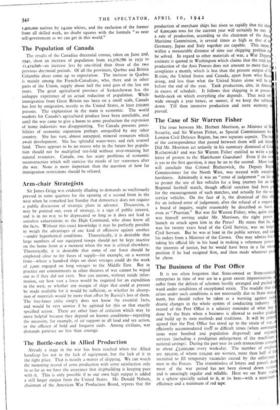The Population of Canada
The results of the Canadian decennial census, taken on June 2nd, 1941, show an increase of population from 10,376,786 in 1931 to 11,419,896—an increase less by one-third than those of the two previous decennial periods. Of all the provinces, Quebec and British Columbia alone come up to expectation. The increase in Quebec is mainly among the French-Canadians, who, there and in other parts of the Union, supply about half the total gain of the last ten years. The great agricultural province of Saskatchewan has the unhappy experience of an actual reduction of population. While immigration from Great Britain has been on a small scale, Canada has lost by emigration, mainly to the United States, at least 25o,o0o persons. The explanation in the main is economic. The world markets for Canada's agricultural produce have been unreliable, and until the war came to give a boom to arms production the expansion of home industries was disappointing. Yet Canada presents possi- bilities of economic expansion perhaps unequalled by any other country. She has vast, almost untapped, mineral resources which await development. She has splendid water-ways and rich unused land. There appears to be no reason why in the future her popula- tion should not be multiplied ten-fold without over-straining her natural resources. Canada, too, has acute problems of economic reconstruction which will exercise the minds of her statesmen after the war. None is more important than the question of how far immigration restrictions should be relaxed.


























 Previous page
Previous page